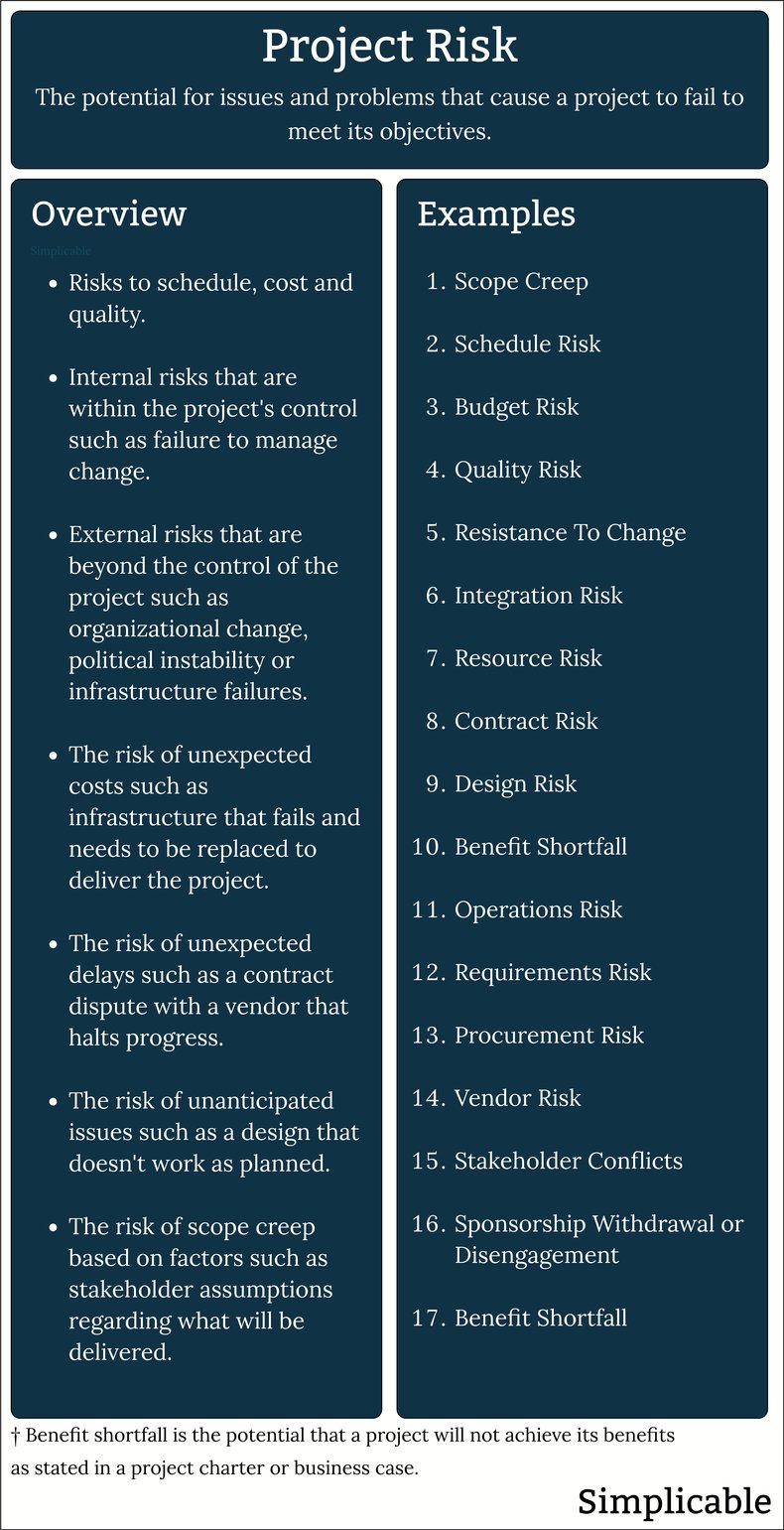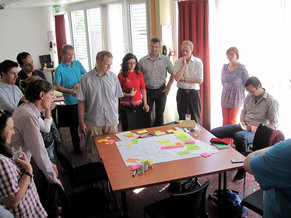
Scope Creep
Scope creep is uncontrolled change to a project's scope. For example, urgent projects may be attempted on a best effort basis that neglects rigorous management of project change.Budget Risk
The risk of budget control issues such as cost overruns. Budget estimates are based on forward-looking estimates that typically involve some degree of uncertainty.Resistance To Change
Resistance to change is a common occurrence whereby departments and individuals defend the status quo and actively resist projects or organizational changes.Integration Risk
Activities involving integration of technologies, information, processes or organizations tend to be particularly high risk and are often underestimated.Resource Risk
The inability to secure sufficient resources such as skilled workers and budget.Contract Risk
The risk that a counterparty such as a contractor will fail to deliver on their contractual obligations to you.Disputes
The risk of disputes that delay the project that potentially progress to litigation.Sponsor Support
Risks related to the responsibilities of the project sponsor.Technology Risk
Technology risks such as service outages that disrupt the project.Schedule Risk
Schedules usually incorporate a significant degree of uncertainty including forward-looking estimates and assumptions.Project Dependencies
Project dependencies can be evaluated for risk. For example, a task that is a precondition for a large number of activities might be identified as a risk.Project Assumptions
Any potential that project assumptions will be invalidated can be documented as risks.Skills Risk
Risks related to training, skill transfers or resources who are inexperienced at a particular task.Architecture Risk
Architecture risk is the potential failure of new or existing architecture to support project requirements.Stakeholders
Any risks related to stakeholders fulfilling their commitments to the project.Operations Risk
Operations Risk is a failure of an organization's core processes. It is a particularly sensitive area of risk because operational disruptions can result in costs, revenue loss and damage to reputation. Projects that touch core business processes often perform a detailed analysis of operational risks.Benefit Shortfall
In some cases, a project delivers to requirements but is viewed as a failure because it fails to meet the benefits stated in its business case. These risks can be documented as project risks.Exchange Rates
If your budget involves payments or revenue in multiple currencies there is typically an associated exchange rate risk.Health & Safety
Health & safety is a special category of risk that requires alignment with the best practices of your organization and industry. Health and safety is typically granted priority over other project concerns and has compliance implications.Legal Risk
Any risk of future litigation related to your project.Quality Risk
Risks related to the quality of project inputs or outputs.Requirements Quality
If your requirements are low quality or haven't been properly validated these factors can be documented as risks.Project Complexity
Complexity is a function of the size and intricacy of a project relative to the capabilities of your organization. It is a known risk factor that complex projects are generally more likely to fail.Force Majeure
The chance of a major negative event beyond the control of your organization such as a war or earthquake.Supplier Risk
The potential that a supplier will fail to meet their obligations to you such as timely delivery of orders.Regulatory Risk
The possibility of new regulations that impact your project. Particularly relevant if your project is implementing compliance related functions.Procurement Risk
The risk of failure of a procurement process such a request for proposal.Security Risk
The risk of a physical or information security incident.Project Estimates
It is common for project estimates to be a significant source of schedule risk. This relates both to the quality of estimates and to the inherent uncertainty of forward looking estimates.Political Risk
The chance of a political event that disrupts your project.Design Risk
The potential that a design will fail to meet requirements or will be rejected by stakeholders.Infrastructure Risk
Risks associated with the infrastructure needs of the project such as roads required to access a construction site.Program Risk
Program risks that impact your project or vice versa.Reputational Risk
Any major exposures the project has that could potentially impact the reputation of the sponsoring business.Partner Risk
The potential for a partner to fail to meet their obligations to the project.Information Security Risk
Any risk that your project will introduce information security vulnerabilities.Facility Risk
Availability of facilities for the project such as offices or data centers.Market Risk
Market risks such as the price of a commodity. Market conditions are a common cause of benefit shortfall whereby a project fails to achieve its stated business results.Project Planning Risk
The potential for project management itself to fail. This is typically documented as a risk when the project manager is required to take short cuts that deviate from the established best practices of an organization or industry.Summary
Project risks are potential problems, issues and shortfalls that can prevent a project from achieving objectives.
| Overview: Project Risk | ||
Type | ||
Definition (1) | The potential for business losses related to a project. | |
Definition (2) | The potential for a project to fail. | |
Related Concepts | ||



















































